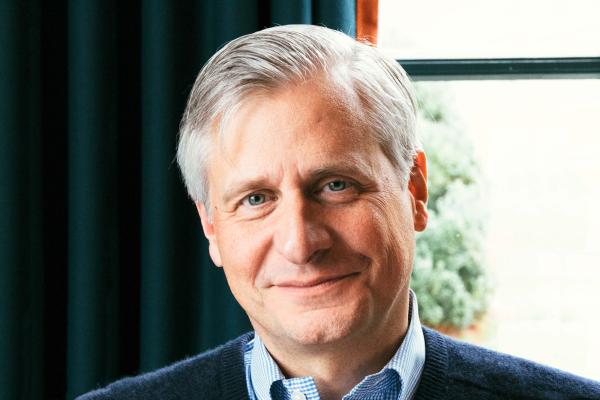Jon Meacham
National Humanities Medal
2022

—Courtesy of CAA

—Courtesy of CAA
When historian Jon Meacham visits the White House to receive a National Humanities Medal, he’ll be in familiar surroundings. As a journalist and author, he’s been inside the landmark residence dozens of times.
Even so, for a man who’s devoted much of his life to exploring America’s past, walking into the nation’s most historic home never gets old. “If you don’t become immersed in the majesty of that house, you’re in real trouble,” Meacham said in a recent phone interview. “It’s always at once humbling and thrilling to go on any occasion. If the White House becomes routinized, then I think you’re not keeping your heart and mind open to the great possibilities of history and majesty of the American story. To be in the White House is just about the closest you can come to being in close conversation with more than 200 years of American history.”
For Meacham, who’s written acclaimed books about the presidencies of Thomas Jefferson, Abraham Lincoln, Franklin Delano Roosevelt, and George Herbert Walker Bush, history is a way of contemplating both the past and the future. “One of the things I find morally orienting in the present is to think about what the future might think of us,” said Meacham, who’s developed the idea into something called “the portrait test.” As he sometimes puts it to the country’s leaders, “What do you want people to think about when they see your portrait in the future?”
Born in Chattanooga, Tennessee, in 1969, Meacham spent his early years where the present and the distant past kept close company. He grew up near Missionary Ridge, the site of a pivotal battle during the Civil War. Soldiers left much behind, including Minié balls, period bullets that brought new levels of carnage to the battlefield. “I could still find the Minié balls when I was growing up. I have three sitting on my desk, and I’m looking at them right now,” Meacham mentioned as he spoke from his home in Nashville, where he holds a chair in presidential history at Vanderbilt University. “For me, history was tactile, and it was never uncomplicated. The American story in all its glory and all its tragedy was part of the landscape where I grew up.”
In his early youth, Meacham sometimes accompanied his grandfather, who was a judge, to the local courthouse, and the trips became another formative influence. The visits regularly brought Meacham up close to the grown-ups who ran things. “I saw people in power not as statues, but as people,” he recalled.
That human dimension informs And There Was Light, Meacham’s 2022 biography of Abraham Lincoln. The nation’s sixteenth president “is often seen as our greatest politician,” Meacham said. “What I wanted to explore was not only how he did what he did but why he did what he did. He was living in a very polarized country. The Civil War was a moral struggle.”
Meacham, whose career has included work in newspaper and magazine journalism, is alert to the telling detail in his books. In And There Was Light, he mentions Lincoln setting a china coffee cup on his bedroom windowsill before he rode to Ford’s Theatre, the Washington, D.C., playhouse where he was assassinated in 1865. It’s a small aside that brings a mythic hero into human scale. That coffee cup in the window, never to be reclaimed by its famous user, also underscores an epic story seemingly cut down in midsentence.
In a broader sense, Meacham’s books contemplate an American story that’s never finished. The Soul of America, his 2018 meditation on how a range of national leaders navigated contentious issues, reminded readers that division and rancor aren’t exclusive to today’s headlines. “The war between the ideal and the real, between what’s right and what’s convenient, between the larger good and personal interest is the contest that unfolds in the soul of every American,” Meacham noted in introducing that best-seller.
At Vanderbilt, Meacham helped create the university’s Project on Unity and American Democracy to promote civil discourse grounded in facts. “To us, unity is not a unity of policy, but a unity of shared reality,” Meacham said of the project.
The Humanities Medal is the latest in a long list of honors for Meacham, who was awarded a Pulitzer Prize in 2009 for American Lion, his biography of Andrew Jackson. But he still counts his humanities medal as special.
“It’s a reminder of what matters, and what we have to keep,” he said. “Without the humanities, democracy doesn’t work.”
—Danny Heitman